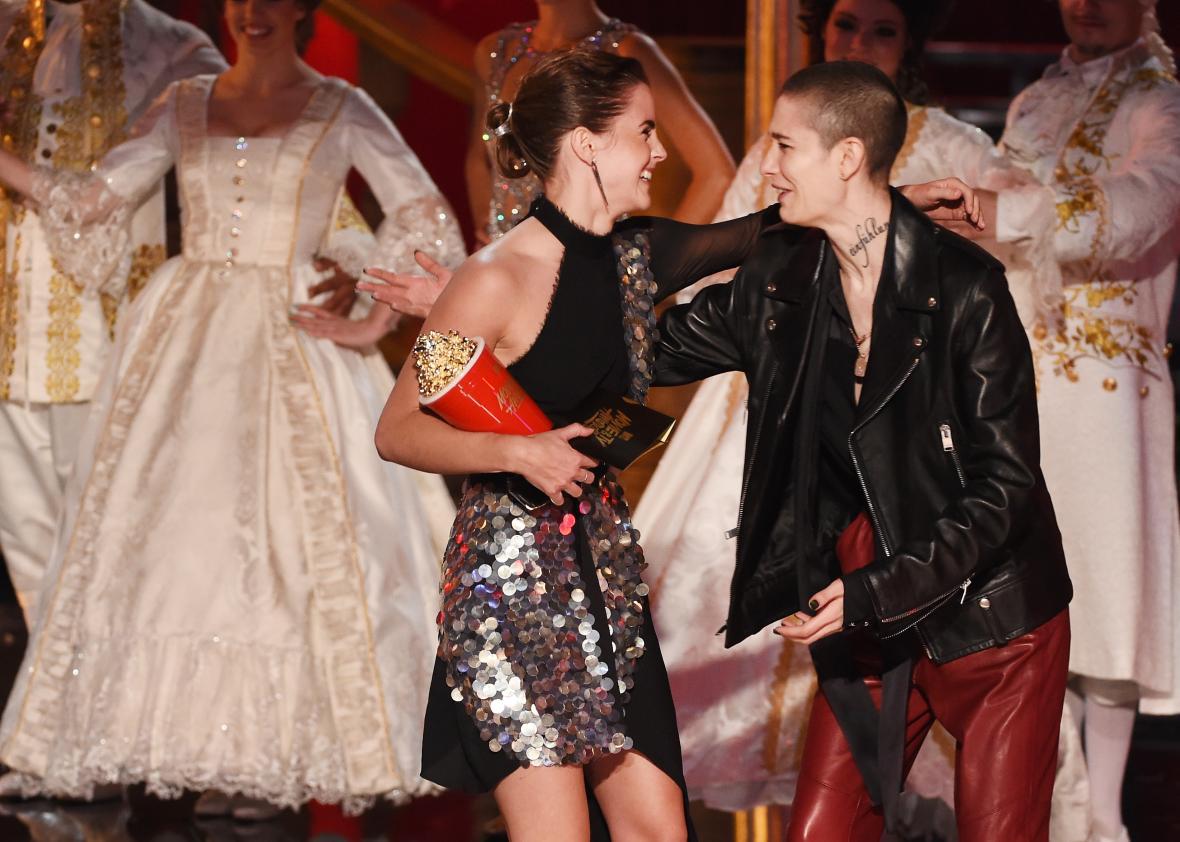When Emma Watson accepted her MTV award for Best Actor in a Movie on Sunday, she applauded the network for its recent shift to gender-neutral award categories. “To me, it indicates that acting is about the ability to put yourself in someone else’s shoes, and that doesn’t need to be separated into two different categories” Watson said. MTV President Chris McCarthy has called those gender-based categories “antiquated” and argued that young people “don’t see those lines in the way that generations in the past have.”
Asia Kate Dillon, the Billions actor who presented Watson with her award for her performance in Beauty and the Beast, has been behind much of the recent public discussion about gendered acting awards. Dillon identifies as gender non-binary and recently challenged the Television Academy on the Emmys’ gender-segregated nomination system, which leaves Dillon and people like them in a bind. The Academy told Dillon they could apply in either the Best Supporting Actor or Best Supporting Actress category, whichever they felt suited them best. For Dillon, that’s an unsatisfactory answer: If they’d felt represented by either of those categories, they wouldn’t have had an issue in the first place.
As mainstream entertainment begins to feature more transgender and gender-diverse actors, Dillon’s dilemma will become more common. Cisgender actors like Watson, too, may chafe at the idea that their achievements are only significant enough to be measured against performers of their same gender. Watson saw a progressive, feminist bent to MTV’s new system calling her statue “the first acting award in history that doesn’t separate nominees based on their sex.”
That’s not entirely true. The Television Critics Association also gives out annual awards for excellence in acting to one performer each in the categories of drama and comedy, without regard for gender. The association first began recognizing individual actors in its 1997 awards ceremony, when a man won in each of the two categories and there was only one woman, Gillian Anderson, among the 11 nominees. Since then, the Atlantic reports, TCA has given 15 out of 20 drama awards and 13 of 20 comedy awards to men.
The TCA example explains why some industry folks and entertainment critics have questioned whether other awards are ready for gender neutrality. In the MTV Movie & TV Awards’ first year, Watson was joined by another young woman, Stranger Things’ Millie Bobby Brown, in the winner’s circle, while male actors didn’t get any best-actor nods. But MTV’s audience and awards skew young, and young women are overrepresented in most awards slates. (In the past five years, three Best Actress Oscars have gone to women under 29.) There are comparatively few roles available for middle-aged or older women, in part because producers and directors keep casting older men with insultingly young love interests. For two recent entries in the fast-growing list of Hollywood violations, see Hero—a 2017 Sundance entry that pairs 72-year-old Sam Elliott with 37-year-old Laura Prepon—and 43-year-old Jamie Denbo’s recent account of being turned down for a role because she was “too old” to play a 57-year-old’s wife.
The entertainment industry offers women of any age far fewer meaty roles than men get, too. According to a 2016 study, in 2015, women made up less than a fifth of the protagonists in the year’s top 100 films, and authors noted that figure was a “historical high.” Gender-segregated categories force the academies to find and recognize standout female performers in an industry that places far more barriers on their roads to success than it does their male peers. This dearth of roles for women, especially older women, may be why the Grammys, which stopped gender-segregating in 2011, hasn’t had a male supremacy problem: Female pop stars and musicians still face sexist obstacles, but they are better able to find success on their own terms, since they’re not quite so limited to the narrow field of opportunity set out for them by writers and producers.
A quota that ensured equal gender representation in nominations could be one corrective to the imbalance in available roles for men and women. But even if such a quota were in place, it would be a shame to see big awards shows go from recognizing two performers in each category to one. Maybe the academies should choose the top two performers in each category of an expanded, gender-neutral (but also gender-equal) nomination slate. The problem of accommodating gender non-binary actors is an urgent one that won’t go away; if academy heads are serious about rewarding excellence in an industry that is slowly beginning to recognize a more diverse collection of performers, they must consider a better-than-binary solution. And if they’re serious about stamping sexism that has plagued Hollywood for generations, they’ll realize that gender-neutral doesn’t have to mean gender-blind.
